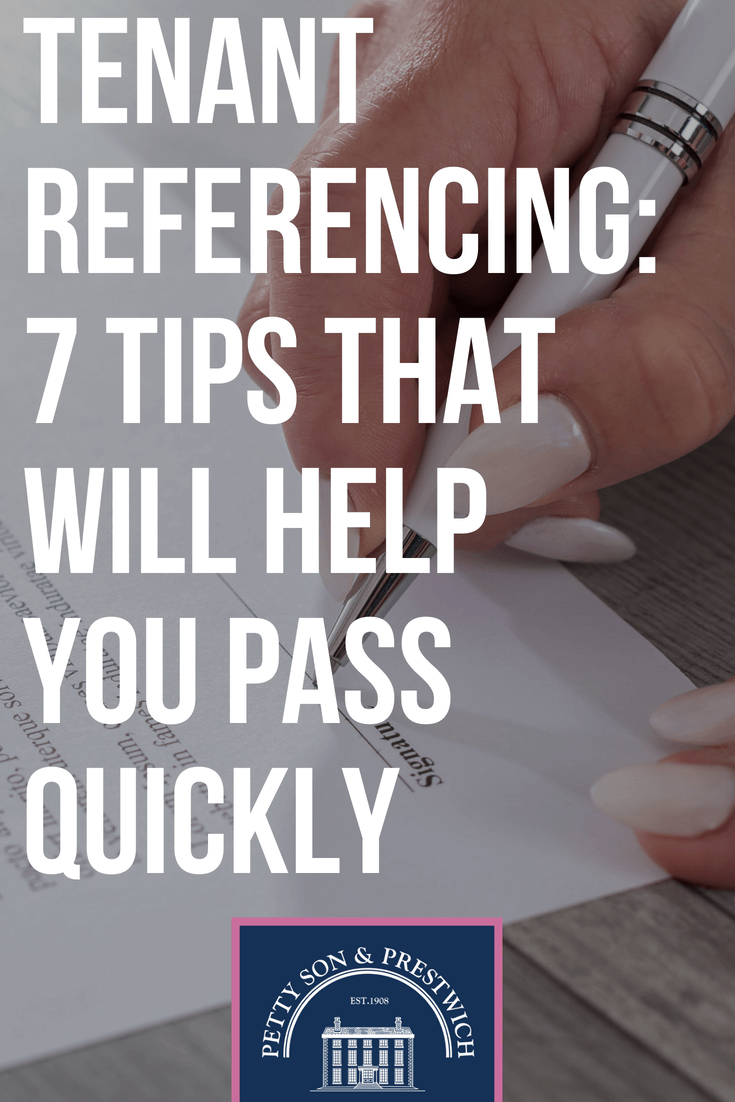For one reason or another, the amount of people choosing to rent rather than buy property in London is increasing. This rise in renters means that landlords often have an opportunity to be picky, so passing tenant referencing quickly and without fuss is now more important than ever.
The tenant referencing process is fairly simple to get through, but only if you know what the potential obstacles may be. In this handy guide, we’ll look at some of the things you’ll need to do if you want to pass a tenant background search with a minimum amount of bother.
Be upfront
Rather than let your letting agent or landlord unearth some bad news about you, it’s always better to be proactive and inform them of anything you feel they may need to know about.
Landlords and letting agents don’t need to know everything about you, so you only need to disclose relevant information. Things such as bad prior experiences with past landlords which may lead to poor references, or a sketchy credit rating are the type of things they’ll be interested in.
Being honest from the start will stand you in good stead. The fact that you are willing to broach a subject that may go against you shows you have integrity and aren’t trying to hide anything. When conducting a tenant reference check, landlords and letting agents will always look favourably upon someone who has put their cards on the table. Remember, they will find out about such things anyway, so honesty is always the best policy.
Get your paperwork together
This is often a stumbling block during the tenant referencing process. While it may not ultimately prevent you from passing the check, it will cost you time if you don’t have your documents to hand. As we mentioned in our introduction, the competition for rented accommodation is increasing, so you’ll want to remove as many delays as possible.
The sort of paperwork you’ll need will include references for renting (both employer and previous/current landlords), bank statements, and passport and visa where necessary. Having these ready to produce immediately will cut down the time you’ll have to wait considerably, and could mean the difference between you getting the tenancy or not.
Inform referees
Many tenants mistakenly believe that landlords and letting agents do not actually follow through and call their referees. Don’t fall into this misguided belief. All good tenant referencing checks will include at least one call to your employer and/or previous landlord. However, they’ll only dig so far.
If your referees fob your new landlord or letting agent off with an excuse and ask them to call back later, the agent or landlord may follow up on the call once or twice, but no more than that. Therefore, it is absolutely vital you get in touch with those who you are naming as referees so they know the importance of the call they can expect to receive.
Answer all correspondence as soon as you can
Unresponsive referees are one thing, but a tenant who is unwilling to act promptly is quite another. If you receive a request for information from your letting agent or landlord, you should move heaven and earth to fulfill their request as quickly as possible.
As part of the tenant referencing process, you will be expected to fill out forms and complete other dull tasks, but don’t be tempted to put these things off. Get them done quickly and you’ll stand a far greater chance of passing the tenant checks and getting the rental you want.
Work out who will pay what
Tenant reference checks will be looking for affordability, amongst other things. In order to get the green light, you’ll likely need at least 2.5 times the cost of the accommodation’s annual rent. So, if the property you are looking at is on the market for £1,200 per month, you’ll need to prove your household is bringing in at least £36k per year (£1,200 x 12 x 2.5 = £36,000).
If you fail to stipulate otherwise, tenant credit checks will assume an equal split between occupants. Therefore, if there are two of you trying to rent a property, the checks will want to see you are both earning at least £18,000 each. However, in the real world, things don’t always work out like that.
One of you may earn the lion’s share of the household’s income and be prepared to pay more rent than the other. If this is the case, you should inform your landlord or letting agent of the split you have agreed upon. If you don’t, and one of you earns less than the required 2.5 times the annual rent, you could fail the tenant reference check.
Secure a guarantor before starting the tenant referencing process
Let’s face it, deep down we’re likely to know whether or not we’re going to pass a credit check, so why leave things to chance? Too often, prospective tenants begin the tenant referencing process with their fingers firmly crossed, but they have no backup plan in place.
If you think your credit history may leave a lot to be desired (and you should make your own credit rating check before beginning the process), it’s a good idea to secure a guarantor before the tenant background search begins. That way, should the worst happen, you’ll have a guarantor’s details to hand and be able to present your landlord or letting agent with a viable alternative.
One thing to remember if you think you are going to need a guarantor is that they will need to go through the tenant reference process in exactly the same way as you do. The only real difference being they will not have to produce references from previous landlords, as they are not going to be the ones living in the property.
Factoring in the extra time this may take is important. It could be wise to bring the subject up with your landlord or letting agent early if you believe you may need to use a guarantor in order to secure the property.
Lastly, have your finances in order
Obviously, credit checks and such will have already been done by yourself prior to embarking on the tenant referencing process, but your financial responsibilities don’t end there, however.
In order to ensure a smooth passage through to moving into your rental of choice, make sure you have all the necessary deposits and fees ready to pay at a moment’s notice. Again, like the aforementioned paperwork, this probably won’t affect your ability to pass tenant referencing, but failing to have it ready will add unnecessary delays to the process.
That’s it. Nothing too complicated. However, not heeding this advice can cost you dear. If you are serious about getting the rented accommodation you’ve set your heart on, you need to make sure you’re going to put your best foot forward from the outset.
If you need any more advice regarding tenancies and renting, please do not hesitate to get in touch with one of our friendly members of staff. They will be able to help you through the process and into a property that best suits your needs quickly and efficiently. Call or drop them a line today.
Lettings office - 020 8989 2091 or This email address is being protected from spambots. You need JavaScript enabled to view it.
Wanstead office – 020 8989 2091 or This email address is being protected from spambots. You need JavaScript enabled to view it.
Buckhurst Hill office - 020 8504 5403 or This email address is being protected from spambots. You need JavaScript enabled to view it.


As Petty’s MD, John steers the ship. He is, however, first to admit that the team around him run the show, and he’s incredibly proud of each and every one of them. Sporty and studious, caring and loyal, John is a father of two wonderful children (and Cooper the dog).
020 3370 8784 / Email Directly